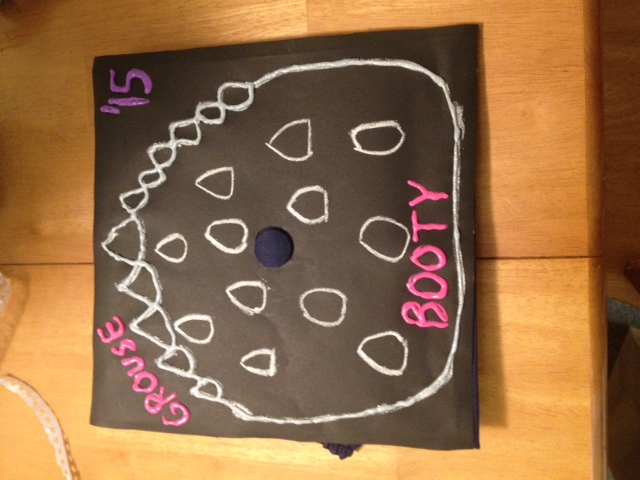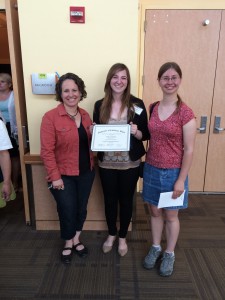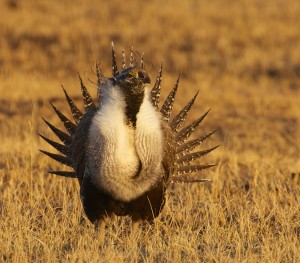
Juvenile Male Sage-Grouse, Cottontail Lek
2014 already has it’s talons in me, but I am pausing a moment to share some recollections of 2013 that was.
Last year I built upon my first full teaching gig in 2012. I taught both Animal Behavior during the summer and Evolution in the fall of 2013. The summer course was challenging because of the accelerated pace and because of some necessary travel, both scheduled and unscheduled, in the middle of the summer term. I was thankful to have an excellent co-instructor (Jamie Bunting), and I think we ended up putting together a nice class. The fall evolution course went well. Having a set of notes to work from made a huge difference in my sanity- I no longer felt quite as much of a ‘trying-to-keep-up-on-a-high-speed treadmill’ feeling. This let me put a lot more of my effort into improving the course. I was much happier with the exams in terms of length and clarity, and the homeworks and discussion were better integrated with the lecture material. To some extent this was behind the scenes stuff, and led to (I think) a comfortable class in which expectations for both me and the students were clearly presented. I look forward to working harder on lecture formats and classroom interaction next time I teach.
Research-wise, we got several projects out the door. These included our collaboration with Sergio Pellis on fighting dynamics in the grouse, an applied paper on the effects of radio collars on male sage-grouse in conjunction with Dan Gibson and colleagues at the University of Nevada Reno, a commentary on the utility of avian vocal studies that rely on calls instead of songs (with my former labmate Lauryn Benedict), and a review of male cooperation that I completed with other lab mates Sam Diaz-Muñoz, Eileen Lacey, and Emily DuVal. We got some of sage-grouse work out the door as well, an acoustics paper led by Rebecca Koch and our laterality analysis- these are in revision though.
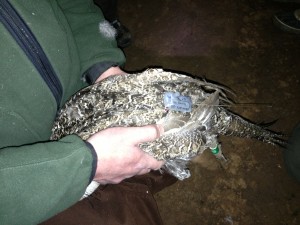
Male Sage-Grouse with the >30g Encounternet tag. Photo GLP.
Our new telemetry tags moved forward in 2013 as well. These tags are intended to give us an unprecedented window into the movement and activity of male grouse off the lek. We were able to do some proof of concept of them in the field at the end of the 2013 season. We followed that up with some testing of the accelerometer function by using some captive chickens in the Avian Sciences facility on campus. Now we’re just waiting for the final tags, and we’ll be ready to break a lot of new ground with our field studies in 2014.
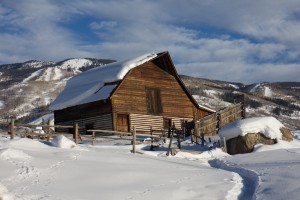
Steamboat Springs, home of the Winter Animal Behavior Conference
2014 is already shaping up to be an exciting year. I got to attend the Winter Animal Behavior Conference a few weeks ago- this is a small, intimate meeting with just a few dozen top behavior folks. The conference strives for a really fun atmosphere. I presented some early analyses looking at differences in the distribution of male mating success on leks of different sizes. It feels great to finally be at the point where we can begin to leverage the multi-lek, multi-year nature of some of our data. I’m hoping that these sorts of analyses can complement our more focused studies and help round out the picture of how “negotiation” on the lek proceeds.
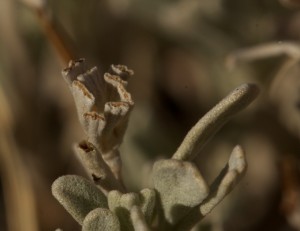
Sage-Grouse usually cut all but the base of the leaf.
Along with making use of our older data, we’re also breaking new ground in the field. In addition to the aforementioned tags, we will conduct our first systematic plant sampling to learn more about variation in quality of the food the sage-grouse depend on during the winter.
This year should see some important and much needed modernization of our workflows as well. We’re finally upgrading our fleet of video cameras to move away from miniDV tapes and onto recording into digital media files on SD cards. This change will necessitate a host of other lab upgrades, including new computer workstations for viewing the video files (we are currently using a trio of refurbished laptops that are literally falling apart) and a robust server to distribute the video files. We may also finally move at least some of our data into a true database instead of simple spreadsheets. These transitions will require quite a bit of planning, but on balance should be big improvements.

